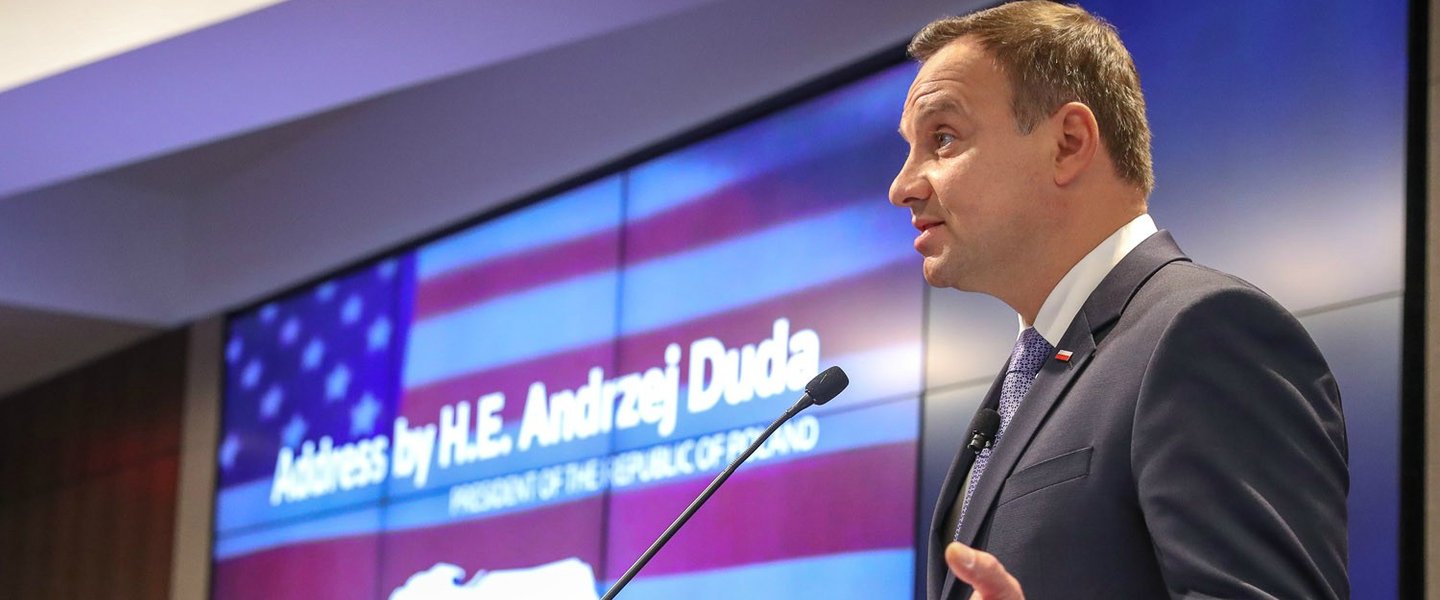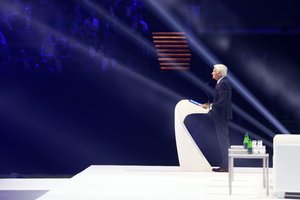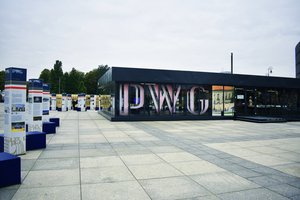Polish-U.S. bilateral economic and security cooperation
Speech by President of the Republic of Poland Mr. Andrzej Duda at the U.S. Chamber of Commerce.
I am delighted to be here and glad that we have this opportunity to exchange views. Before we begin, I would like to thank the U.S. Chamber of Commerce, as well as Thomson Reuters for making this meeting happen.
The Chamber of Commerce is the leading trade organization in the world. It embraces the interests of over 3 million businesses from all sizes and all sectors. Many of them have been operating in Poland for years. Their presence has been beneficial both for my country and the United States.
This presence, and the investments it promotes, contributed to the economic development of Poland. It is the linchpin of the transatlantic ties between our countries. We are very much interested in deepening these relations for the sake of global security and prosperity.
Poland has always wanted to be a part of the free world. As a nation, we have contributed to the development of Europe for centuries. Even when Poland did not exist on maps, or when it existed as a communist puppet state, we, the Poles, have always longed for freedom.
We fought against all odds. We won and recovered. In the early 90s, the Polish economy was in a state of decay, devastated by nearly half a century of being exploited by the communist regime. We had to build a liberal, free market economy from scratch. We succeeded thanks to our people, their commitment, their brainpower and entrepreneurship. I believe it is something our nations have in common – we dream big and we also pursue our dreams.
It was the United States we looked at during the dark times. And you answered the call. In the early 90s, the first American companies appeared and invested in Poland. Their presence and significance for our economic and political conditions grew bigger with time. Looking for business opportunities, US firms created jobs and contributed to the growth of the Polish economy. We took advantage of your good practices, your corporate culture, your know-how and your expertise.
Today, Poland is a strong and dedicated member state of the European Union and a reliable NATO ally. In Europe, we are considered to be a leader of economic growth. When the recent financial crisis erupted, all European economies plummeted, but one. The Polish economy kept growing. In fact, it has been growing continuously since the early 90s. In 1990, the size of Poland’s economy amounted to 65 billion USD. Today, it is almost eight times bigger – 475 billion USD.
Our success story is perhaps best reflected by the expansion of Polish companies on foreign markets. Again, needless to say, due to its size and structure, the US market has been an appealing market for Polish firms.
Let me strengthen this point with some data. In the first 6 months of 2016, Polish export to the US was worth approximately 3,5 billion USD. That’s more than a 10% increase when compared to last year figures. In fact, there are more Polish products on the American market than you are aware of, ranging from cosmetics, chemicals, to software – even world class video games.
Have you heard of the Witcher series? It’s a role playing game based on books written by Andrzej Sapkowski, a Polish fantasy writer. In 2015, the Witcher 3 won the “Game of the Year” title at the prestigious Video Game Awards. Overall, it received more than 800 prizes and earned enormous recognition among gamers and critics. Success was reflected in money. CD Project Red, the company that engineered the game, is traded on the Warsaw Stock Exchange – its market value is of 1 billion USD. Again, this is just an example. Today, there are numerous Polish products that are highly appreciated in the U.S.
We are very much aware that innovation is the key component of a modern, competitive economy. It has a crucial impact on productivity and growth. Therefore, the Polish government is working on a set of new policies to boost innovativeness. I hope that innovation will constitute an important pillar of the economic cooperation between our countries. I see great potential in harnessing the abilities of our brightest minds.
Let me provide you with a proper illustration: just last year, Polish students from the University of Science and Technology (AGH) in my hometown, Kraków, won a NASA competition for the best planetary probe. This year, students from a high school in Płock, a city located 100 km from Warsaw, Poland’s capital, took the first prize in a competition organized by the European Organization for Nuclear Research (CERN) based in Geneva.
Just a week ago in Poland, I had the enormous pleasure of hosting an event dedicated to “Start-ups”. A group of best, young Polish entrepreneurs were invited to present their innovations – ranging from drones, through a start-up, which creates hardware and software solutions aimed at increasing the efficiency of industrial machines, ending with a company, which focuses on sign language interpretation and on improving communication between clients with hearing disabilities and customer service operators.
I firmly believe our goal and our responsibility is to create conditions for such companies to flourish. This is an area I am very much engaged in.
Business and innovation are not the only spheres in which our countries can constructively cooperate. I am referring to those where economics and politics meet, namely: security, energy and transatlantic economic relations.
In terms of security, a lot has changed in the past quarter of a century. Following World War II, Poland was forced to be a part of Soviet block. You may be surprised but the Polish military was trained to run large scale offensives through Germany to Denmark and Benelux countries. These plans were handed over to the CIA by a Polish colonel and Cold War spy for NATO: Ryszard Kukliński. Zbigniew Brzeziński (former US National Security Advisor) described him as “the first Polish officer in NATO.”
Since then a lot has changed. In 1999, Poland joined NATO and quickly became a U.S. reliable ally. Facts speak for themselves. Our soldiers were brothers-in-arms in Afghanistan and Iraq. We actively support the efforts of the global coalition fighting the so-called Islamic State.
In July Warsaw hosted the NATO Summit, during which it’s members took important decisions that significantly increased defense capabilities of the Alliance. NATO’s Enhanced Forward Presence on Eastern Flank was agreed upon. Here allow me to thank the U.S. for committing to serve as the Framework Nation in Poland. We will do our best to host your soldiers with a great doze of hospitality. Additionally, I would like to express my gratitude for strengthening the U.S. military presence in Europe through the European Reassurance Initiative (ERI).
All of these measures have contributed to increase the security of my country. But we are not free riders. As one of the few NATO allies, we are fulfilling our joint commitment to spend 2% of our GDP on defense. As such, our military is undergoing a continuous modernization process. 10 years ago, we bought US-made F-16 fighters in order to strengthen the Polish Air Force. Last month, the Polish Ministry of Defense formally launched the acquisition process of Patriot missiles by addressing a Letter of Request to Raytheon and to the U.S. Government. In the future, Poland plans to modernize its forces by purchasing new submarines and helicopters through tenders. All are welcome to participate.
Nevertheless, tenders are only one from a handful of options. We have great examples of cooperation between our defense industries. Activity of Lockheed Martin in Poland is the case in point. Black Hawk helicopters are produced in the Polish town of Mielec. It remains the largest production site owned by this company outside of the United States. So far, Black Hawks built in Poland have been bought by five countries. This cooperation is deeper than just manufacturing. Last month, the Warsaw University of Technology and Lockheed Martin successfully demonstrated a UAV - unmanned aerial vehicle – optimization technology. These are some of the illustrations of synergy between our people and economies.
"When it comes to gas, the Iron Curtain still seems to cut Europe in two. In the western EU, markets are large but diversified. In the east, markets are smaller but much more dependent on Russia" – said Pierre Noël, French energy expert. But that was in 2009.
We learned our lesson. Over the last decade, our efforts on diversifying import routes has brought significant results. Infrastructure has been built. Reverse flows have been installed on gas pipelines, enabling gas flows in both directions. This year, we launched our first LNG terminal. It has an import capacity of 5 billion cubic meters per year.
Not only have we increased our import potential, but we are also determined to bring energy security to the broader region of Central Europe. One of our priorities is building interconnectors with our neighbors. Just recently we have completed the feasibility study for the construction of a new gas interconnector with Ukraine. Poland aims at creating a gas hub for the region. The U.S. could play an important role in that project.
We appreciate that the U.S. Administration shares our views on the Nord Stream 2 project. If built, this pipeline will significantly decrease the energy security of European countries. This project has no economical basis since an infrastructure to sell eastern gas already exists. Building Nord Stream 2 would fortify the energy Iron Curtain Pierre Noël talked about that we have been trying to overcome for last years.
It is strategically important because the whole region of Central and Eastern Europe is still dependent on Russia for its gas supplies. But ironically, Russian gas delivered to Western Europe has proved to be cheaper than one delivered to our countries. In other words, the closer you sit, the more you pay. Just like at the opera.
It would be difficult to discuss investment and trade opportunities without mentioning the Transatlantic Trade and Investment Partnership.There has been a lot of criticism surrounding TTIP recently. Poland still supports negotiations if they reach an agreement which is balanced and mutually beneficial. Having said that, I view TTIP as an opportunity to enhance the exchange of goods, services and investments between our countries. More importantly, I believe that this agreement would act as an anchor: holding together the transatlantic community, and complementing the role that NATO plays in the field of security. If we strike a deal, mutual opportunities will emerge.
The transatlantic ties have a special place in the minds of the Polish people. Partnership with the US is the basic pillar of our security. We value the cooperation with the United States in other areas, including trade and investment, innovations and energy. We praise this cooperation even more, because it reflects the values that we all share. Our alliance is founded on a strong belief in freedom and democracy. Poland wants to be a partner in a continuous effort to spread prosperity and development in the free world.
The job of governments is to create conditions for you and your companies to operate. Many of you have already known Poland to be a business friendly environment. With its rapid development, Poland has much to offer. I encourage you to take time and look into those opportunities. Let us be successful together. Thank you very much for your attention!
Source: President.pl
20.09.2016







